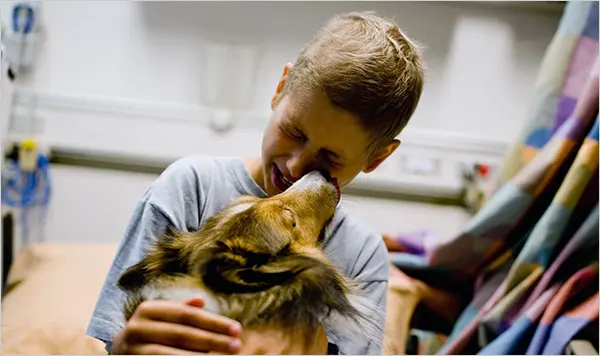Animal-Assisted Therapy (AAT) covers an expansive spectrum of activities. This may include visitations of hospital and long-term health care facilities by pet therapy teams; equine assisted psychotherapy; prison cell dog programs, reading programs using teddy bears as reading companions, etc.
Animal-assisted therapy (AAT) engages participants with animals – typically dogs but also sometimes cats, chickens, guinea pigs and horses – by petting, playing with or feeding them. This type of interaction increases oxytocin levels which help people feel happier and relaxed.
1. Reduces Stress
Dogs are the most frequently employed therapy animals; however, other animals such as horses, rabbits and even guinea pigs have also been proven to alleviate stress for patients. All therapy animals must be selected, trained and handled under supervision from certified pet therapists so as to ensure both patient and animal are safe from harm.
One study by researchers discovered that university students reported feeling immediately less stressed and happier after spending time with therapy dogs than those from a similar group who did not spend any time with any animals; these feelings persisted for at least 10 hours afterward.
2. Increases Self-Esteem
Dogs form instant bonds with clients, often building trust within a therapeutic setting. Dogs may help children open up more and communicate more easily during sessions with a therapist by creating an atmosphere of safety for sharing personal details about themselves.
Petting a dog releases serotonin, prolactin and oxytocin hormones which improve mood and relax an individual, providing significant psychological benefits that help build self-esteem and build confidence when working with mental health professionals. Therefore, animal-assisted therapy offers significant advantages to those needing confidence boosters in their work environments. This should be taken into consideration when working with people in need.
3. Improves Sleep
Anyone who has spent time with a pet knows just how rewarding their company can be, as petting and playing with pets releases oxytocin which calms the brain and reduces stress levels.
Therapy animals are used as part of goal-oriented sessions led by qualified therapists. Therapy animals may include dogs (canine-assisted therapy) and horses (equine-assisted therapy, such as at Southern Delaware Therapeutic Riding in Milton), or any animal capable of supporting therapeutic processes.
Dog-assisted therapy is one of the most commonly employed therapies, though other animals such as rabbits and cats have also been utilized. A therapist may simply allow their patient to interact with an animal during therapy sessions or devise specific games designed to meet an aim or goal for that session.
4. Reduces Anxiety
Anxiety can be a significant problem for individuals with intellectual disabilities, but studies show that therapy animals are an effective solution. When people interact with animals they release oxytocin which encourages patients to participate more fully in therapeutic processes and treatment goals with greater confidence.
One study compared the effects of animal-assisted therapy and regular therapeutic recreation sessions in hospitalized psychiatric patients. Participants completed the State Anxiety Inventory, a self-report measure of current anxiety levels. Within-group analysis indicated that one animal-assisted therapy session significantly decreased state anxiety while therapeutic recreation did not.
5. Increases Self-Regulation
From nature’s soothing environment to working with animals and experiencing their release of oxytocin, animal therapy can provide people with a means of better regulating their emotions – particularly children with difficulty managing negative feelings such as anger and anxiety.
Sessions of animal-assisted therapy are structured and goal-directed, conducted under the supervision of an experienced psychotherapist with specific training in this area. Furthermore, this individual must belong to a professional body that ensures high ethical standards are upheld during each therapy session.
One study discovered that teens benefited from this form of therapy by feeling less stressed, decreasing anxiety and depression levels, opening up within counseling processes, and building self-confidence and self-esteem.
6. Improves Communication Skills
Animal-as-partner can facilitate communication and improve social skills for children with neurological differences. A recent study demonstrated how having a pet dog in the home reduced challenging behavior for those living with dementia.
Therapy animals also help people build empathy and social interaction skills, which is especially useful for patients who struggle to express their emotions – this could include people suffering from mental health conditions like schizophrenia and schizoaffective disorders.
Therapists that utilize animals as therapy must be qualified and experienced professionals, members of a professional organization to demonstrate that they’re upholding high professional standards, and committed to animal welfare measures such as selecting suitable pets and providing training as necessary.
7. Increases Self-Esteem
People who interact with animals in therapeutic settings may notice their self-esteem improves. Utilizing animals as part of treatment processes may encourage people to open up more easily to their counselors and learn how to interact with others during sessions.
Many therapists and counseling offices utilize therapy pets as part of their practice, while there are designated facilities where clients can go for pet therapy with trained, screened animals under their care, with handlers trained specifically in pet handling.
Animal-assisted therapy sessions are a rapidly expanding industry and can be found anywhere from prisons and detention centers, nursing homes and therapist’s offices to maximum security prisons, detention centers and nursing homes. Animal therapy dogs offer comfort while also teaching people how to trust one another.




